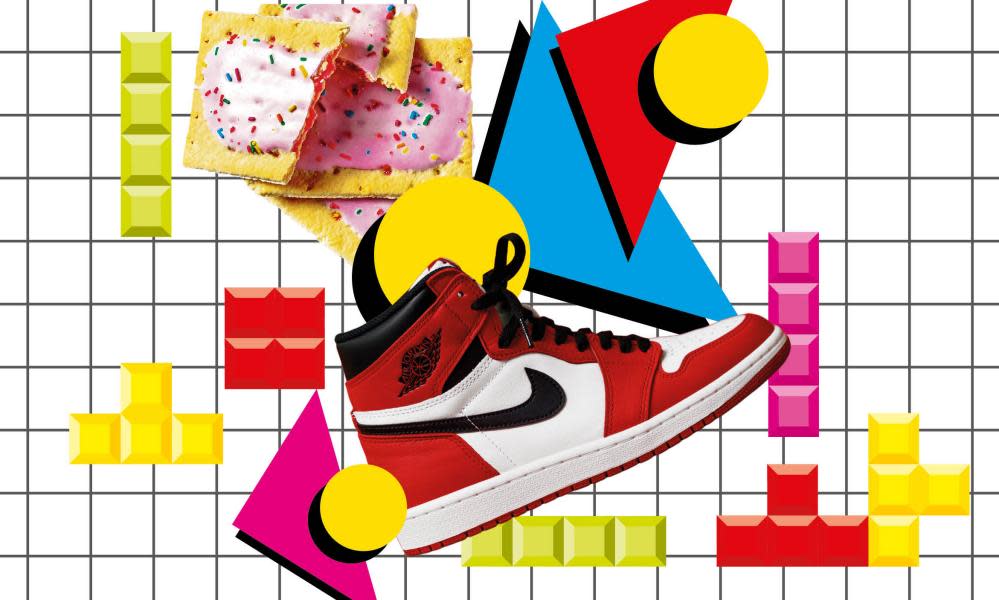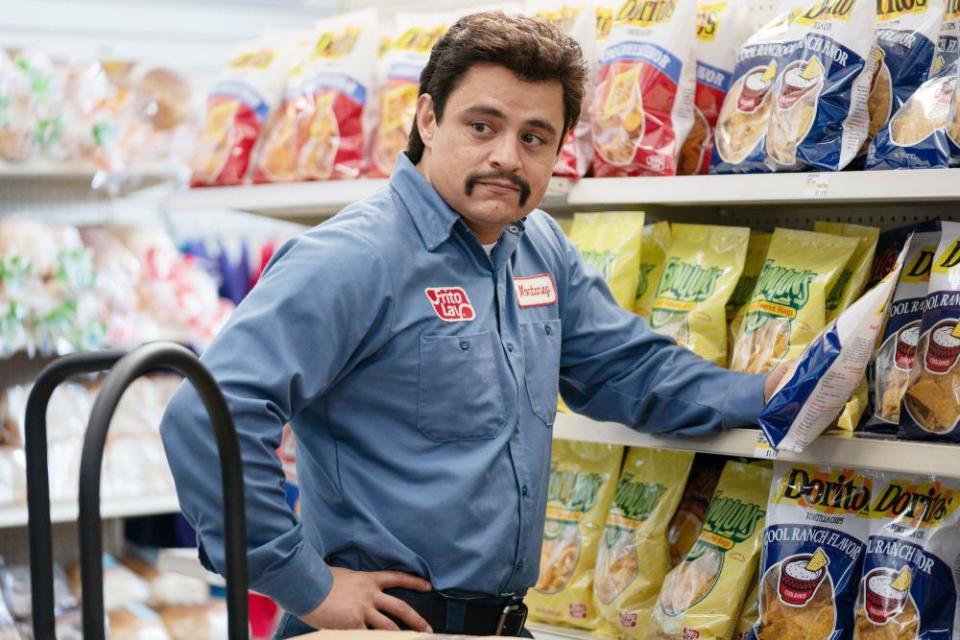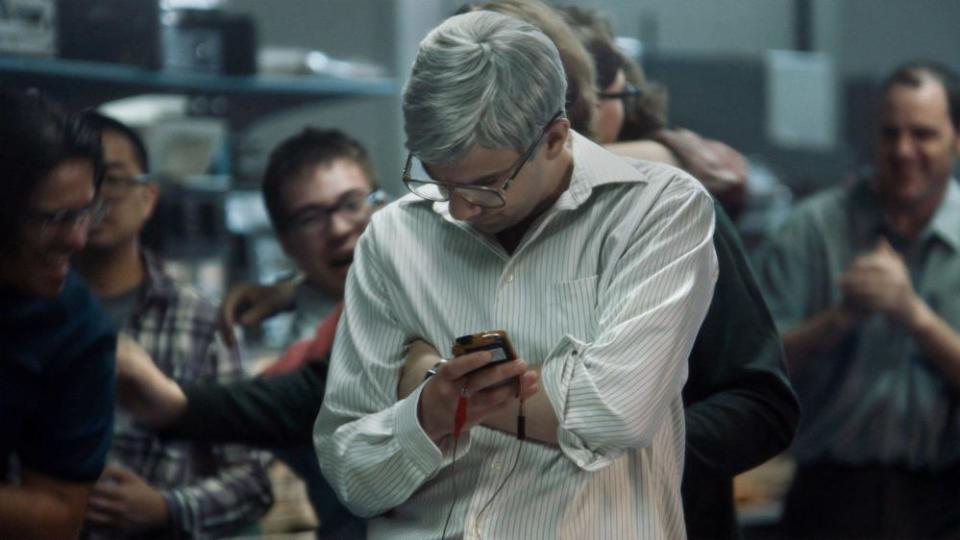In business: how brands like Nike, BlackBerry and Pop-Tarts became film’s hottest stars

Steam trains, tuberculosis, sexual repression, the shadow of a coming war and Colin Firth: the stuff of a period piece was once unchanging. But history is not what it was. Now conjuring the past on screen means 8-bit graphics and Money for Nothing. And Adam Driver and Greta Gerwig will do a synchronised bop before the vintage logos of Pringles and Pepsi.
That last detail comes from the credits of White Noise, Noah Baumbach’s recent adaptation of the 1985 Don DeLillo novel. The book was, among other things, a droll study of the godly place of brands in the US during the 80s. But two giggly new movies now spotlight the same moment with hindsight. In Air, Ben Affleck directs himself and Matt Damon in the 1984 origin story of the Nike Air Jordan. With Tetris, the scene is four years later: Taron Egerton, star of the rum tale behind the video game, plays the video game designer Henk Rogers, drawing together a collapsing Soviet Union, feral press magnate Robert Maxwell and the marketing department of Nintendo.
But like a glorious supermarket, there is still more choice. Summer will see the release of Flamin’ Hot, Eva Longoria’s debut as a director: a biopic of Richard Montañez, the janitor at snack giant Frito-Lay, who, in 1990, is said to have invented the title’s totemic flavour of Cheetos. Pending, too, is BlackBerry, moving later into the 90s to portray the Icarus of Canadian smartphones.
For all four films, the period is an easy win. From Gen X execs to teenage fans of Stranger Things, the stretch of time from the mid 80s to 90s – Rubik’s Cube to early internet – has become the site of a consensus nostalgia: a past we can all agree on. And beyond the big hair and Bon Jovi, the touchstones of the age are the brands, the stuff people bought.
Of course, the 80s has no monopoly on people doing that – or the nostalgia it creates. Jerry Seinfeld is soon to direct his first film, Unfrosted: The Pop-Tart Story, set in 1963. At that point, DeLillo was still working as a copywriter at Ogilvy & Mather, the New York ad agency that inspired Mad Men. But it was the 80s when consumer brands truly claimed our souls. It was the moment DeLillo captured in White Noise; now cartoonishly revived by Air and Tetris.
But that makes us sound gullible, doesn’t it? So these movies have to do something smart: tap our innocent joy around old computer games and junk food, while also letting us feel we are more knowing now. We duly step behind the curtain into the backstories of the brands, to find the uplift and the truth, which is where it gets complicated.
Behind most brands will be a corporation, and to make feelgood from those would be a trial for even the most gifted film-maker. Few of us have misty eyes for the corporations in our lives. Pull on the loose ends of one of those histories and you end up with something like The Social Network, director David Fincher’s chilly portrait of Mark Zuckerberg en route to signing up 2.9 billion, in his own words, “dumb fucks” to Facebook. Or The Founder, with Michael Keaton as the razor-toothed Ray Kroc, swallowing whole the owners of a family-owned burger restaurant to give the world McDonald’s.
But Tetris and Air are made from different stuff: jaunty celebrations of lovable mavericks. It can make for delicate decisions around how much reality an audience can bear. Flamin’ Hot may already have misjudged that. The Los Angeles Times has reported serious factual flaws in the story of Montañez – in short, that he may not have invented Flamin’ Hot Cheetos.
For Affleck and the makers of Tetris, though, no one is talking wholesale invention (bar the odd Moscow car chase). Instead, at least at first, you are simply asked to unplug your sense of irony, before relaxing with two industrial underdog stories, financed by Amazon (Air) and Apple (Tetris).
Such is the first rule of cheerful movies about corporations. You don’t talk about the corporations. Instead, in Tetris, Nintendo is really a support act to Egerton’s Rogers, the lone wolf Dutch-American developer who championed the game. And while Nike is more prominent in Air, our hero is the kind of square peg who barely gets a security pass: Sonny Vaccaro, played by Damon, a paunchy basketball guru pushing Nike chief Phil Knight (Affleck) to go all in on the young Michael Jordan.
Here at least, Rogers and Vaccaro are the Spider-Man meme come to life: identical one-offs, twin outsiders, gatecrashing meetings and the system, staking it all on their gut. “Sometimes you gotta say fuck the rules,” Henk declares, and Sonny would agree. (It can be hard to watch either film without sensing powerful gusts of over-identification from Affleck and Tetris producer Matthew Vaughn.)

By now, the nostalgia is cranked so high that we have passed through the 80s and landed in the Frank Capra 1930s, when little fellas with big ideas were the best of the US. And the bad guys are as obvious as the villainous Mr Potter in It’s A Wonderful Life. In Tetris as in life, Robert Maxwell is reekingly corrupt. In Air, the sadsacks of the board stifle risk-taking. Between Buddhist aphorisms, Knight pines for the old Nike when he was free of such dead losses.
Frankly, old and new can both feel old with these movies: the only woman with a proper role in either is Michael Jordan’s mother, Deloris (played by Viola Davis). But the lesson is clear – capitalism goes wrong only in the hands of crooks and squares.
The nostalgic glow is warm indeed: an ode to a time when free spirits such as these had a seat at the corporate table. The optimistic gleam is dazzling: all hail a smarter, fairer, funner capitalism. On-screen, the Air Jordan trailblazes a profit-sharing model with star athletes, presented as a victory for street kids everywhere. Tetris gives us nothing less than the last days of Soviet communism, Egerton playing air guitar to The Final Countdown while Muscovites chant for Levi’s.
Utopia was at hand, and you got it down at the shops. Not everyone loved the same brand. Quite the contrary. As per DeLillo, deep nuances of identity were conveyed in a preference for a Nike swoosh over the three stripes of Adidas. But everyone loved brands: shiny blank slates. Consumer choice was a happy alternative to ideology or nationalism. As the giddy teenager played by Paul Whitehouse in the 90s sketch comedy The Fast Show would have put it: “Isn’t capitalism brilliant!?!”
Which is why the clock stops when it does in these movies. And why BlackBerry is the outlier; the ghost at the feast. The star of that story, Mike Lazaridis (Jay Baruchel), is yet another misfit genius. But his arc is different, eaten alive by the corporate world. The timeframe, too, is telling. While the setting of 1996 is dressed up with period detail, it also nudges us into the age of the internet: the here and now, to which technology, capitalism and our ids delivered us.
Cue a montage of the dystopian weirdness of the last decade. Brands would come to mimic people, firing shots on social media, and people turned into brands, every post on Insta affirming core values and strategic alignment. Do that well enough and you got to be an influencer, paid to hawk tat for one vast corporation on a platform owned by another.
But wait! An urgent voice would now surely argue that the spirit of Rogers and Vaccaro lives on in plain sight. Sadly, that voice belongs to Elon Musk, who clearly sees himself as the madcap-savant of modern business, but whose idea of comedy is layoffs conducted with laughcry emojis.

All told, who wouldn’t feel a pang for the time when capitalism was meant to provide ever-cooler gizmos, rather than endless new ways to immiserate us? How bittersweet to recall expressing our inner selves in the supermarket, now the own-brand defines ongoing hard times. (And all this before AI destroys half the jobs in Europe and America. Good grief, maybe even mine.) This was not the future we were promised in 1990 – the moment Air and Tetris now freeze in time, like a cure for what ails us.
You may need to check your receipts. Because the snag is, what these movies are selling never existed. Both are set in an 80s since rebranded as a clueless, power-chord paradise, where even the business dudes were rad and gnarly. But Affleck and Vaughn are old enough to know reality was more complex: the age of Thatcherism and Reaganomics was also one of broken unions and mass unemployment, a thrill ride of recessions and market crashes. (Not that it compares to Russia’s free market experience in the 90s. Tetris wisely cuts beforehand. It would make quite a blooper reel for the closing credits.)
Yet a lot about 80s capitalism has endured as well. Aside from appearing in three feelgood new movies, Nintendo, Nike and Frito-Lay also share a record of allegations of “union-busting” and harsh treatment of staff and workers. But Flamin’ Hot doesn’t highlight Frito-Lay’s so-called “suicide shifts”. And Air finds Nike in the vanguard of progress. It even notes Knight’s $2bn in charity donations.
Unmentioned, however, is his backing of organised campaigns against tax increases for high-income individuals; or the company’s long history with sweatshops; or the fact that young Americans would be attacked and even killed for their Air Jordans, tragedies that have been linked to Nike’s marketing and pricing.
Would a good name for all this be movie-washing? Ask a branding expert. But a film is defined by what it leaves out of the frame. And nostalgia is less about memory than forgetting. It helps us forget the present, by helping us forget the past. Remember that, when, in 40 years, another batch of fun-packed movies appears to tell the quirky, uplifting stories of Yeezy and Uber – and, yes, Musk too.

 Yahoo Movies
Yahoo Movies 
